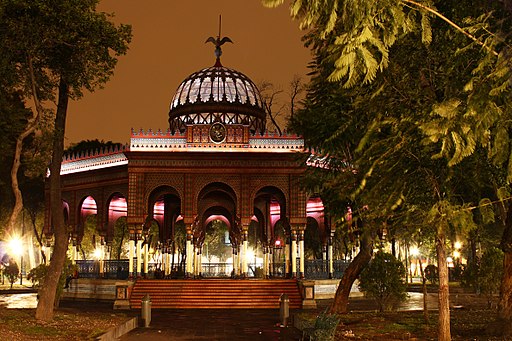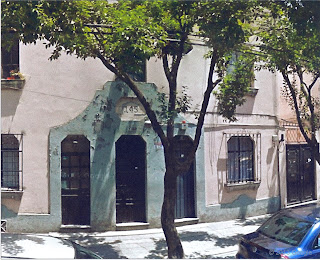 |
| Moorish Kiosk, The Alameda Park, Mexico City. By Ulisesmorales (Own work) [CC-BY-SA-3.0 (http://creativecommons.org/licenses/by-sa/3.0)], via Wikimedia Commons |
My grandmother, Catalina (Perrotin) Huesca, lived in a small one bedroom flat at 145-B Carpio Street, in the Santa Maria la Ribera neighborhood. The neighborhood, or colonia, was the oldest in the Federal District. Its centerpiece, just a block from my grandmother’s house, was The Alameda Park, a beautiful colonial square block park perfect for family gatherings and lazy Sunday afternoons. My father, Gilbert Cayetano Huesca, taught me to ride a two-wheel bicycle in that park.
In the middle of the park was a stunning, arched Moorish-style kiosk built of colorful tiles laid in intricate geometric designs. Made of iron from given the engineer by his friend, Andrew Carnegie, the kiosk had been designed as the Mexican Pavilion at the World’s Fair from 1884 – 1885 in New Orleans and later at the Saint Louis Fair of 1904 before being dismantled and brought to Mexico City in the early 1900s. On weekends it was often the scene of concerts and other performances. You can see a panoramic view of the kiosk here.
Abuelita lived in one of two first floor flats in an early twentieth century, four unit building on a tree-lined street. Her living room looked out to the sidewalk.
As you entered into the house, you passed under a small shelf that hung over the door. The shelf held a framed picture of Saint Martin de Porres, my grandmother’s favorite saint. You would continue down a long two-tone green hallway that ran the length of the home as you walked down a tile floor of brown and beige octagonal mosaic tiles set in a honeycomb pattern. To your left, you would see each of the other rooms.
My grandmother’s bedroom and bathroom were in the center of the house, followed by a tiny kitchen and a dining room at the rear. All the rooms had windows overlooking the courtyard next door. The courtyard itself led to the home of my Bisabuelita or great-grandmother, Maria (Amaro) Perrotin, and my great aunt, Blanca Perrotin. Maria was in her late 90s and had survived three husbands; Blanca was a spinster. They came over every day and stayed past dinner, telling stories around the dining room table.
About halfway down the hall to the right, you would follow the hallway around an angled turn. There, the lathe-and-plaster wall ended and a metal half wall began. It was topped by a long bank of glass block windows. A metal door opened into a small patio filled with potted geraniums and other flowers and plants whose perfume permeated the air. Abuelita left the door propped open door open all day long to let the fresh air and sunshine into the house.
She also loved to listen to the chirping of her canaries. Though she had a radio and television in the dining room, the canaries made the real music in the house. They lived in cages in the hallway between her bedroom and the kitchen. At any given time they numbered between 6 and 15, all singing their own cheerful songs. My grandmother said they were singing their prayers to God, because God loved all creatures, especially the small ones. She put them out in her sunny patio when she awoke and brought them in the late afternoon, covering their cages with an old towel so they would quiet down for the night.
 |
| My grandmother’s home (to the right) at 145-B Manuel Carpio Street, in Mexico City. Courtesy Google Street Maps. |
I recall asking whether they had names, and she said no, but she knew which one was which, anyway. After counting them, I announced that she had as many canaries as she had children, so we should name each of them after my father and his 10 brothers and sisters. She threw her head back and laughed heartily, rubbing my head. “Go ahead, then,” she said. We tried that for a while until I realized that unlike my grandmother, I could not tell them apart. Still, I credit her with giving me a love for birds and their sweet songs, especially those colorful canaries, which even to this day, remind of of her and give me reason to smile.
The Spanish language uses a lot of diminutives, and this seemed to apply especially well to my grandmother. The word Abuelita translates into English as “little grandmother,” and she was barely taller than I was. Everything about her was petite, her hands, her feet, even the tiny wavy curls crowning her head. She had so many! I just couldn’t figure out how they stayed that way. I never saw her curl her hair at bedtime, so in my little nine-year-old mind I decided that she must have had to put it up in pin curls and just left them that way for oh, maybe a year or so. I had not yet heard of permanents.
I think that because she had raised 11 children, she had incredible patience to put up with all of us while we lived with her in that little house. She never complained but seemed overjoyed to have us, even though it must have meant a lot of extra work. She was an excellent cook, having learned from her own mother. She also had been the cook at the hotels and restaurants she and my grandfather, Cayetano Huesca, owned in Tierra Blanca and Perote, Veracruz. She did not have many pots and pans, but I do remember watching her cook her amazing Mexican-style rice in a cast-iron skillet on a gas stove.
My mother, Joan (Schiavon) Huesca, tried her best to learn how to cook my father’s favorite Mexican dishes from Abuelita. One of these was a breakfast casserole of eggs, chiles, and tortilla strips, called Chilaquiles. My mother tried her best to pronounce the word, but it always came out as “Chili-Killies.” After trying to cook it and several other dishes a few times, she gave up and stuck to the Italian dishes she had learned from her own father. My grandmother did not mind and was happy to let my mother cook from time to time, raving especially about her spaghetti and meatballs.
Water was – and continues to be – a problem for the residents of the Federal District. Mexico City was built on Lake Texcoco in 1519, and the constant draining of water from the lake and has not only caused the city to sink but also has not been enough for the millions of people who live in one of the largest cities in the world. Water was severely rationed, and people became expert at conserving it. Every morning after everyone had bathed, my grandmother cleaned her bathtub and filled it with water so she could use it for cooking, and washing hands and dishes, among other things. Every day, the city turned the water off in mid-afternoon and turned it back on the next morning. A couple of times a week, we also experienced power outages, and my grandmother would borrow her votive candles from her room to light the way for all of us.
I think the house was built of lathe and plaster, and like many houses down there, it became cold and humid in the winter. There was no central heating. Instead, my grandmother used a tall, portable black kerosene stove to keep warm. With so many people living there, my parents bought second stove. They were always very cautious around the stoves, mindful of the many fires there had been from people who had been more careless.
Not long after we arrived, I asked if I could claim the pantry, which had been converted into a broom closet and ironing room, as my bedroom. My grandmother let me put a cot there, but it stuck out into the hall. I tried it for much of the day, happy to have a place of my own to retreat to from our noisy family, but I think I gave it up before bedtime when I realized I didn’t want to sleep there all alone. That was the end of “my” room.
Copyright © 2013 Linda Huesca Tully
Linda, I always love seeing a new post from you! You write so vividly. I feel as though I am standing in the hall of your grandmother's house, counting the canaries right along with you. 🙂 Thank you for sharing.
Thank you so much!
Awesome blog, Linda. Enjoyed reading. Love the stories and the recipes! I'm an addicted cook! Glad to be in the "challenge" with you.
I'm glad you've enjoyed it, Bettyann – and that we're in this writing challenge together! Isn't it fun?